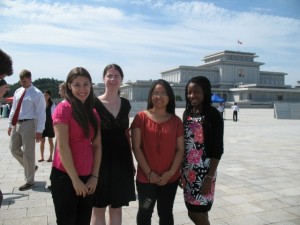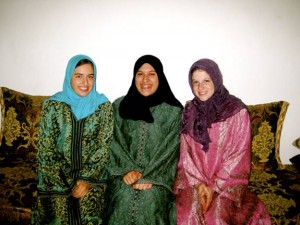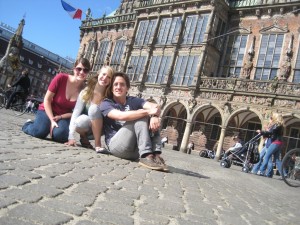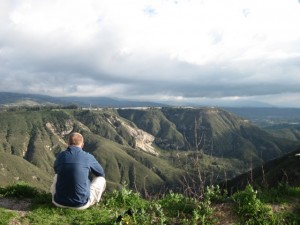
Melissa Drennan '12, Margaret Abelkop '14, Ha Nguyen '13, Lorre-Ann Fisher '12 near Kumsusan Memorial Palace in North Korea.
Among the key objectives in Lafayette’s strategic plan is “to create a curriculum and learning environment for the new century that are innovative, progressive, challenging, and distinctive – a signature Lafayette experience.”
One way the College is working to provide this signature experience is by increasing its commitment to global education. It is enhancing faculty-led semester and interim (short-term) study abroad programs and expanding the geographical and cultural scope of its global offerings, particularly in non-Anglophone countries.
Students are already reaping the rewards. For instance, this summer, Allison Alexy, assistant professor of anthropology and sociology, and Seo-Hyun Park, assistant professor of government and law, led a two-and-a-half-week course, Interconnections in Northeast Asia, which explored China, North Korea, and South Korea. Organized with the help of the P’yongyang Project, a Beijing-based nonprofit, the class was the first time an American institution offered a for-credit study abroad program bringing students to North Korea.

Megan Schultz ’12, L-R, Anna Schulman ’12, and Hallie Zeller ’12 were part of the faculty-led semester program in Madrid, Spain.
“While the study of cultures and socio-political institutions of Western Europe still occupy a central place within Lafayette’s curriculum, the balance of global power has shifted since the end of the Cold War,” explains Michael Jordan, director of international and off-campus education. “Our students’ academic interests reflect this change; we see a growing interest in Asian studies and languages, for example, as well as the Middle East.”
In addition to assessing the quality of its offerings, the Office of International and Off-Campus Education helps students in all phases of their study abroad experience, from choosing the best program for their needs to pre-departure orientation sessions.
There are other exciting new programs in the pipeline. Lafayette recently became the school of record for Frontiers Abroad, a New Zealand-based program concentrating on environmental science and geology. It features a five-week field camp before the semester begins and integrates the study of the indigenous Maori culture to give students a broader perspective on environmental issues facing the nation. In fall 2012, the College will roll out a new faculty-led program in Costa Rica. Based in San José, it will feature classes taught in English and Spanish as well as excursions throughout Costa Rica, Nicaragua, and Panamá.

Amy Hinkel '12, center, in spent a semester in Bremen, Germany, through the College's faculty-led program.
One of the most important aspects of study abroad is making sure it fits a student’s academic program. Students don’t have to know where they want to go when they visit Jordan’s office. He can help them choose a program that’s right for them – whatever their major might be. Even engineering majors, who have to follow a strict schedule to keep on track for graduation, can study abroad thanks to innovative faculty-led programs in Bremen, Germany, and Madrid, Spain, where students earn engineering credits while abroad.
“Engineering students at most universities have difficulty studying abroad and staying in proper sequence,” explains James Ferri, associate professor of chemical and biomolecular engineering, who has led the Spain semester abroad. “Lafayette’s program is fairly unique among undergraduate engineering programs. Each department in the engineering division carefully coordinates course sequences so that the sophomore spring semester contains courses that can be taken abroad.”

Lucas Reilly '13 at the Globe Theatre in London.
The faculty-led semester gives students the best of both worlds. They get to experience a foreign culture with the guidance of familiar faculty mentors, taking classes from Lafayette professors as well as those at host institutions. They also take part in field trips, which are planned and led by Lafayette faculty with the help of local organizers.
It’s often a life-changing experience. Chemical engineering major Amy Hinkel ’12 (Doylestown, Pa.) studied engineering and German language and culture in the program at Jacobs University Bremen in Germany, led by Anne Raich, assistant professor of civil and environmental engineering.
“Learning how to integrate into different cultures was one of the most challenging, yet rewarding, activities I have ever taken part in, and has led to many of my fondest memories,” says Hinkel. “Most importantly, I have learned how to feel at home wherever I am in the world, and due to the lasting, genuine friendships that I made in Bremen, I am confident that I truly do have an open door waiting for me in every corner of the world.”
Lucas Reilly ’13 (Sayre, Pa.), an English and music double major, jumped on the chance to spend last fall semester in Suzanne Westfall, professor and head of English, who has been leading study abroad experiences to London since 1990.
“I had never gone overseas before, and I felt like London would be a good place to get my feet wet,” he says. “The city is like a cultural appetizer – you get a taste of nearly everything. I can’t list the number of languages I heard each day while making the five-minute walk to class. It’s like nothing I’ve ever experienced.”

Chris Kelly ’13 looks out at the Andes Mountains in Ecuador.
For students who cannot complete a semester abroad, there are still plenty of opportunities to incorporate a global component into their education. Lafayette is in its 33rd year of offering concentrated, three-week, faculty-led courses during the interim session between semesters. In many courses, students meet prominent business people, cultural figures, government officials, and academics, learning directly from these experts about the subject matter they are studying.
This past January, students studied the evolution of both life and land in a new interim-abroad course to Ecuador and the Galapagos Islands. Geology professors Lawrence Malinconico and David Sunderlin and Wendy Hill, provost and Rappolt Professor in Neuroscience, led the program.
“The high Andes and the Galapagos Islands are home to textbook examples of so many phenomena in natural history,” says Sunderlin. “To be there, on the rim of an active volcano or in the brush thicket with Darwin’s finches, actually observing phenomena that are so important to how humans now understand the world, is a powerful experience.”
Students also traveled to Egypt in a new interim-abroad course to study the relationship between art and technology with the 5,000-year-old pyramids and temples as their primary classroom model.
“We were able to see art conservation at its finest at the Abu Simbel temples to Rameses II on the banks of Lake Nasser,” says Christina Abruzzo ’12 (Summit, N.J.), an art and economics double major. “The temple was once buried by sand and threatened by the expansion of Lake Nasser. Art conservationists broke it apart, reinforced it with concrete, and moved the entire site back to higher ground within three years. The temple was not only saved but is now stronger than ever in a safe new home. The Abu Simbel temples epitomized the art and technology theme of the course.”
For more information on the variety of Lafayette’s study abroad programs or to learn more about how to apply, visit the study abroad website.





1 Comment
Comments are closed.